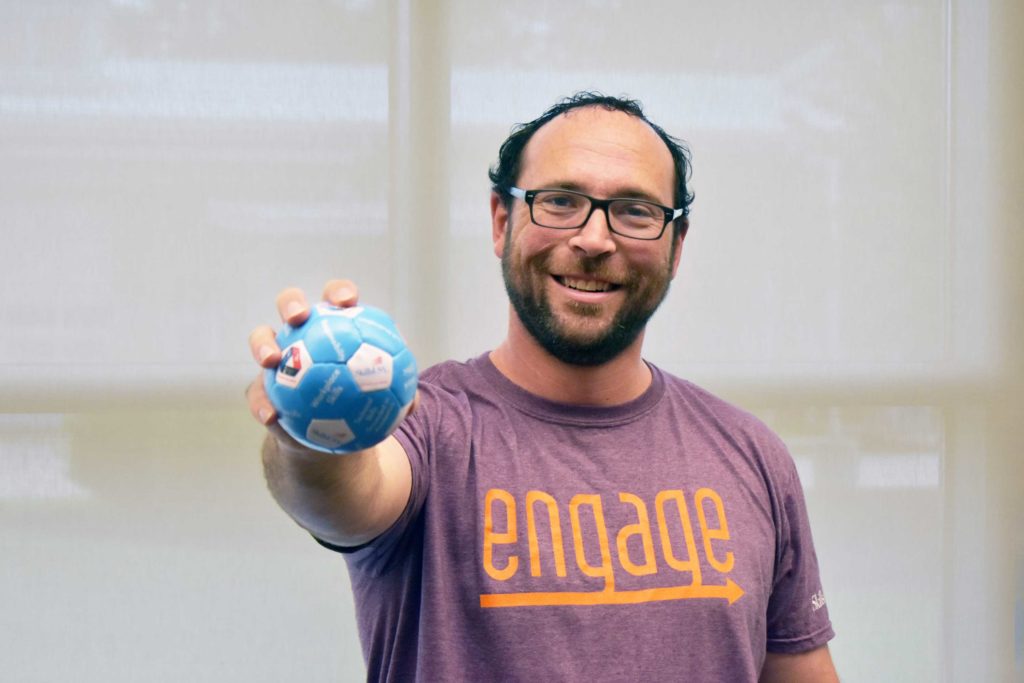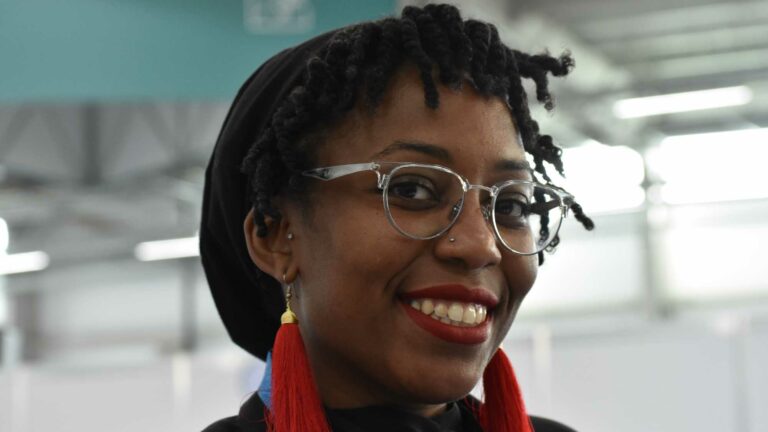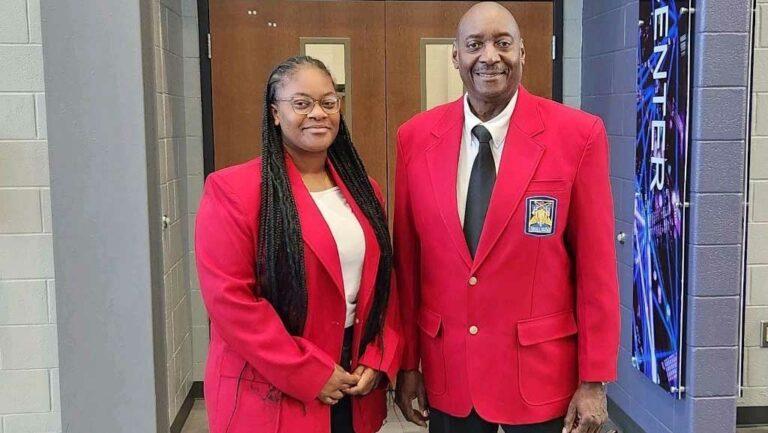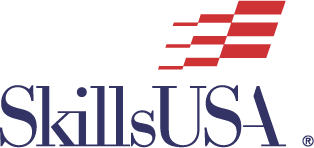Photo used with permission.
There’s a saying that success does not come to you; you must go to it. SkillsUSA Advisor of the year Joseph Chapman has demonstrated spectacular success, not just for himself but for his students. The South Carolina law enforcement instructor at The Center for Advanced Technical Studies in Chapin, S.C., says, “Not every student I teach will go into the criminal justice field, but they can all leave my program as a better version of themselves.”
In earning SkillsUSA’s highest honor for teachers in 2020, Chapman proved you can outpace “average” even as a new SkillsUSA advisor who doesn’t have the support, funding or resources in place to accomplish everything you want. He rolled up his sleeves to ignite change on campus, elevating the concept that the school’s goal is to deliver every graduate career ready. Chapman admits, “I spent quite a lot of time in our little staff lunchroom discussing that idea with the other teachers.” The school even changed its mission to “empower all students with the knowledge and career skills necessary to be successful in a dynamic global society.”
In former times, the school was what he calls a “competition chapter,” but Chapman wanted to change that with a multistep activation plan to reach SkillsUSA integration. He set out to gain SkillsUSA knowledge, get trained and obtain resources. Next, he shared what he learned with other teachers. Finally, he guided students to take the lead in their own learning.
Chapman began his career in law enforcement after graduating from the University of South Carolina with a bachelor’s degree in criminology and criminal justice. He spent 11 years as an award-winning deputy with the Richland County Sheriff’s Department, including four years as a law enforcement instructor.
He knows coming from industry into the classroom is challenging. “I was lucky that I was already an instructor before I came to the high school, so it meant changing my teaching from adults to teens which — given the way adults act sometimes — wasn’t too different. But a lot of teachers arrive to career and technical education without that classroom experience.”
Pivoting SkillsUSA to Prominence
When Chapman assumed leadership for the SkillsUSA chapter, the school director explained that he wanted SkillsUSA to become a more prominent force on campus. “I spent my first year organizing our competition program and educating myself, then attended the 2019 National Leadership and Skills Conference and completed Engage training for advisors. That’s where I found what I needed to begin leading our chapter forward,” Chapman says.
At nationals, he befriended other teachers and connected with industry partners while soaking in several days of training and learning how the SkillsUSA Framework, Program of Work and Chapter Excellence Program intersect to guide student activities. Chapman recalls an epiphany at the 2019 national conference when it became clear to him that “the difference between those at the top in SkillsUSA and everyone else was the Framework. They knew it, they applied it, they lived it. We did not.”

When school resumed in the fall of 2019, he “met with other teachers and discussed what I learned at nationals, vowed to build SkillsUSA up and to provide more opportunities for students.” He knew those opportunities would come from the integration of SkillsUSA throughout the curriculum.
The first vital integration occurred when Chapman and his student leaders created a database of SkillsUSA resources. The archive provided teachers with the ability to easily search SkillsUSA activities and teaching ideas based on an Essential Element, time allotment, class size or materials needed. The teachers have access to all the educational resource books, Framework thumb ball, Framework cards and more. They can have students lead the activities or do it themselves. “They can even make an advance request to have a student leader or myself lead the activity, and this is available to any program and for every student,” Chapman explains.
At first, teachers used the resource library when they had a substitute. This expanded into using the library to discover icebreakers and short activities for Framework incorporation. “I used different types and lengths of activities in my own classroom and shared the results as discussion points in staff meetings. This gradually led to increased use of the Framework by the other teachers.”
The second major integration of SkillsUSA began in Chapman’s classroom when he carved out a regular time slot dedicated to teaching the Framework. “Many Wednesdays during the school year have delayed openings. I put in my syllabus that every delayed-opening Wednesday includes at least one hour of personal or professional development. This is where I began diving deeper into the Essential Elements with students. I still use the Framework on other days, but this focused time is well worth the effort.” The students were unsure at first, but that quickly changed to enthusiasm. After working with the student leadership, the chapter decided to integrate the Framework at monthly meetings, in their community service projects, through their professional development and by aligning to the Chapter Excellence Program.
Challenging Students to Lead
After training the officers, Chapman tasked them with running the chapter themselves. Meetings were held after school and began with a 30-minute business meeting with food from the culinary students, followed by 90 minutes of Framework-related activities. “We used the SkillsUSA Essential Element Assessment and various educational resources to plan.” Chapter officers led each activity, followed by a reflection. The officers would critique their performance and then prepare for next time. “We averaged over 60 members at meetings. Our chapter is now the largest and best-attended student organization at the school,” Chapman says with delight.

While Framework skills can be taught in any order, Chapman refined his own strategy. “I believe the triangle is the strongest shape. I teach the Framework in a clockwise formation, with personal skills first, and then workplace skills and then technical skills. Getting the personal skills under your belt and functioning well as a person makes learning the workplace skills go a lot smoother. While eventually mastering those technical skills is important, I find that our local industry really wants those personal and workplace skills taught first, because that’s what they are looking for even more than the technical skills.”
Gaining Followers and Believers
Chapman garnered new partner support by connecting industry to the school through the student activities and by introducing a quarterly newsletter that now has 500 subscribers. “We began last school year with a minimal SkillsUSA budget, no funding and no real presence. Our efforts paid large dividends. With every intentional interaction, we gain followers and believers,” he says. “The buy-in is real. We gained nine sponsors and over $18,000 in funding this year.” Chapman says one of the hardest parts about running an organization in a large, high-achieving school district is standing out from the crowd. “This is especially difficult due to the high rate of success in our district. Awards and statistics can be lost in the static of everyone else’s accomplishments. While this does not diminish the importance of the recognition, it also does not gain active support and buy-in. To truly catch attention in a way that others thirst for more, investment is crucial. How do you stand out among so many others that are successful?”
Prior to the pandemic, The Center for Advanced Technology SkillsUSA chapter stood out through sustained effort: They amassed over 1,100 hours of professional development, over 500 hours of community service and grew to become the largest CTSO in the district. Whether they were holding a school open house, feeding the homeless, running a blood drive, writing 400 letters to veterans or conducting 120 mock job interviews, there was measurable growth in every member who participated.

The South Carolina native and father of two says SkillsUSA has quickly became a huge part of his family’s life. “My favorite conversation with a student, which nearly brought me to tears, was with one who told me she had no confidence in herself before SkillsUSA. Later she told me that she now knew she was beautiful, smart and could make it. Our local industry has been stunned by my students’ professionalism, communication and maturity. One offered an internship and another a job on the spot. Another came to me explaining he wanted to begin hiring our members in the summer and explore internships specific to our chapter.”
Chapman sums up his indelible passion for the organization in the most pragmatic terms. “Employers would rather hire those with a strong work ethic, integrity and responsibility than someone at the top of their academic class. CTE provides students with the means to acquire the skills employers value,” Chapman says. He plans to deliver on that promise to industry, not only to meet their needs but to ensure the futures of each of his students.
Regional Advisors of the Year
Region One Advisor of the Year

Maryland teacher Charlene Zinnel, a culinary arts instructor at Dorchester Career & Technology Center in Cambridge, Md., is Region One Advisor of the Year. Associated with SkillsUSA for more than 20 years, the lead advisor’s chapter has received the SkillsUSA Chapter Excellence Gold Distinction twice and earned a Models of Excellence award in 2018 for outstanding programming. Zinnel transformed the school’s SkillsUSA involvement from participating in competitions to a more active chapter that engages all aspects of the SkillsUSA Framework. She has been a member of the SkillsUSA Maryland board and a state officer advisor for the past 20 years. She is a member of the national education team for Commercial Baking and has been named Maryland Advisor of the Year three times. Zinnel was named Chef of the Year two times by the local chapter of the American Culinary Federation and CTE Educator of the Year by the local Rotary Club. This past year, she was Dorchester County Teacher of the Year, the first time a CTE teacher earned the honor.
Region Three Advisor of the Year

Ohio teacher Sara Plozay, a cosmetology instructor at Upper Valley Career Center in Piqua, Ohio is the winning advisor for Region Three. She began teaching at the center in 2012, became a state advisor in 2013 and a SkillsUSA chapter advisor in 2014. She has mentored two state officers, five national officers and several regional officers as well as numerous competitors. Her chapter has earned a Models of Excellence award four times. Conducting more than 30 training sessions, she became a SkillsUSA certified trainer in 2018. Plozay started the Esthetics and Barbering contests in Ohio and facilitates a leadership exploration conference for over 125 members. A graduate of Miami Valley Career Technology Center, she was a SkillsUSA member and officer. Following in the footsteps of her mother, a cosmetology instructor and advisor, Plozay decided to become a teacher too. In 2014, she earned the Miami County Excellence in Education award and in 2017 she earned the Ohio ACTE Pacesetter award. Plozay also received the 2020 Ohio ACTE Outstanding Educator in Community Service award.
Region Four Advisor of the Year

Oklahoma teacher Cody McPherson, a technology engineering instructor at Geary High School in Geary, Okla., is the winning advisor for Region Four. He began the SkillsUSA chapter at Geary High School three years ago; he also advises Geary Middle School students who participate in SkillsUSA. A high school welding student and three-time state champion, he served as both a state officer and national officer. McPherson is a third-generation alumnus since his dad and grandfather were members of VICA. By engaging and empowering his students, six have been elected as district officers, three were state officer candidates and 24 have been state medalists. His chapter won the 2019 Model of Excellence award in workplace skills. McPherson was recently named a “NextGen Oklahoman 30 under 30” for his service to others.
Region Five Advisor of the Year

Washington state teacher Kimberly Miller, a culinary arts and early childhood educator at Woodland High School in Woodland, Wash. is the winning advisor for Region Five. She has taught for 33 years and has served as the assistant CTE director for the past two years and is a strong advocate for career and technical education and student organizations. Her SkillsUSA students run community service fundraising events to purchase food for local families, this year earning $3,952 for the local food bank and collecting more than 2,000 non-perishable food items. Miller’s chapter earned the SkillsUSA Chapter of Distinction Gold award four times and earned SkillsUSA Model of Excellence awards in workplace skills in 2018 and technical skills in 2020. She has served as a state officer advisor, regional coordinator and state board member. She was named Washington state’s ESD 112 Teacher of the Year in 2019 and was a finalist for Washington State Teacher of the Year. Miller believes in giving students maximum opportunities to prepare for their future








